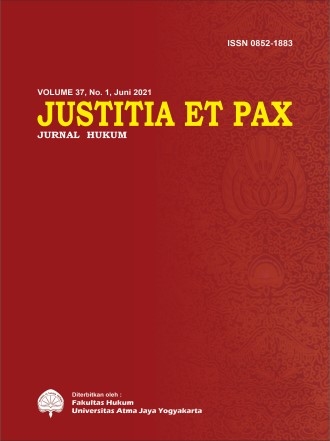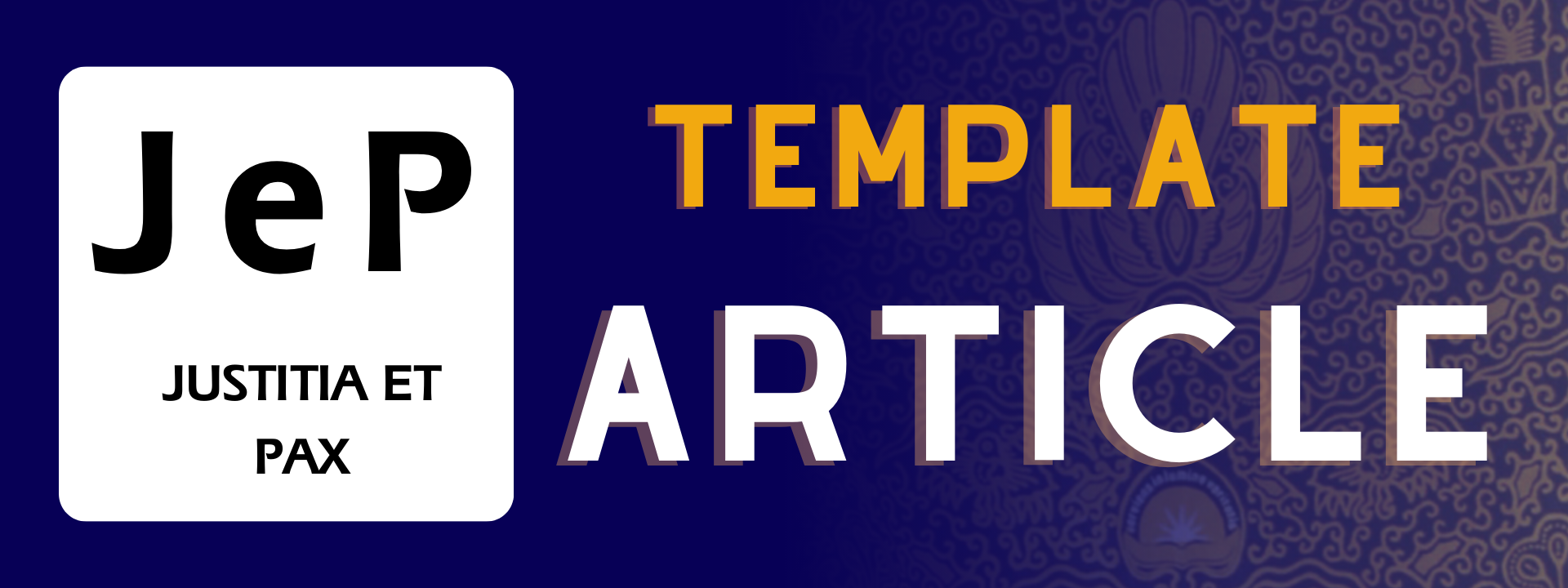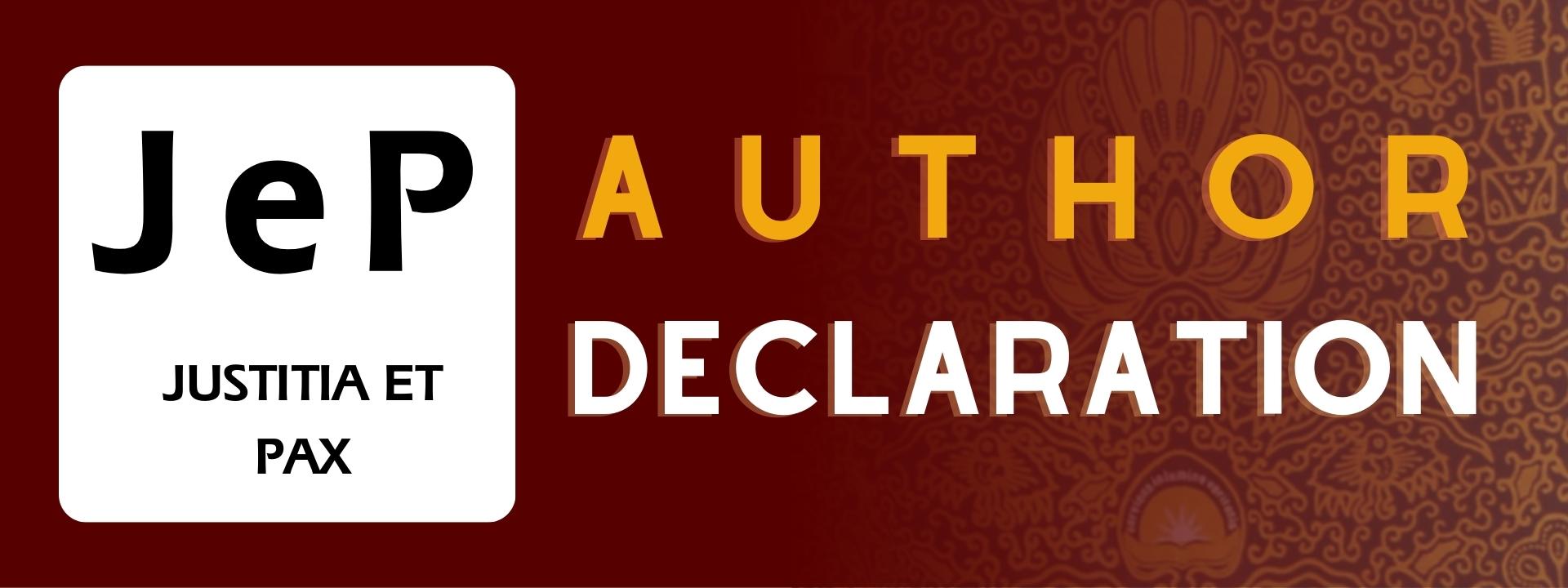KEADILAN RESTORATIF DALAM SISTEM PERADILAN PIDANA SEBAGAI PERWUJUDAN NILAI-NILAI PANCASILA
DOI:
https://doi.org/10.24002/jep.v37i1.3821Keywords:
Pancasila, Restorative Justice, Criminal Justice System.Abstract
Pancasila is the ground fundamental norm as the ultimate source of law in Indonesia. Based on that concept, the establishment of National Legal System shall be based on values contained in the Pancasila. One of the reforms of legal system is the establishment of restorative justice. Restorative justice is the concept where in solving criminal law matters, all related parties shall be involved. Restorative justice is the implementation of Pancasila values in the criminal justice system. The problems discussed in this paper is the urgency restorative justice concept in criminal justice system in reflecting Pancasila values. In terms of existing regulation, restorative justice is merely regulated in The Act of Juvenile Justice System (UU SPPA), the Police Commissioner’s Regulation Number 6 of 2019, and the General Attorney Regulation Number 5 of 2020. However, the implementation in practices, restorative justice still has many weaknesses, including the diversion provision. By discussion restorative justice and Pancasila, it can be stated that restorative justice aims to create social justice for everyone involved in a criminal law case and form a cultural mediation in the system. In short, restorative justice is one of crucial concepts in implementing Pancasila values.References
Buku
Arief, Barda Nawawi, 2008, Mediasi Penal: Penyelesaian Perkara Pidana di Luar Pengadilan, Pustaka Magister, Semarang.
Atmasasmita, Romli, 2012, Teori Hukum Integratif: Rekonstruksi terhadap Teori Hukum Pembangunan dan Teori Hukum Progresif, Genta Publishing, Yogyakarta.
Atmoredjo, Sudjito, 2016, Idelogi Hukum Indonesia, Dialektika, Yogyakarta.
_________, Sudjito, 2019, Hukum di Tahun Politik, Dialektika, Yogyakarta.
Dignan, James, 2005, Understanding Victims and Restorative Justice, Open University Press, Maidenhead, Berkshire, UK.
Hiariej, Eddy OS, 2015, Prinsip-Prinsip Hukum Pidana, Cahaya Atma Pustaka, Yogyakarta.
Hirsch, Andrew von, et all, 2003, Restorative Justice and Criminal Justice: Competing or Reconcilable Paradigms?, Hart Publishing, Oregon.
Sudarto, 1979, Suatu Dilema Pembaharuan Sistem Pidana Indonesia, Fakultas Hukum Universitas Diponegoro, Semarang.
Utrecht, E. and Moh. Saleh Djindang (1), 1989, Pengantar dalam Hukum Indonesia [An Introduction to Indonesian Law], 11th print, Penerbit Ichtiar Baru dan Penerbit Sinar Harapan, Jakarta.
Zulfa, Eva Achjani, 2009, Keadilan Restoratif, Badan Penerbit Fakultas Hukum Universitas Indonesia, Jakarta.
Jurnal
Aertsen, Ivo, et, al, “Restorative Justice and the Active victim: Exploring the Concept of Empowerment,” Journal TEMIDA, 2011.
Budiartha, I Nyoman Putu, “The Existence of Pancasila as a Basic Rule toward the Dispute Settlement of Complaint Offence through Penal Mediation outside the Court of Indonesia”, Journal of Legal, Ethical and Regulatory Issues, Vol. 22, Issue. 2, 2019.
Dewantary, Zenny Rezania, “Keadilan Restoratif dan Pembatasan Diversi Pada Undang-Undang 11 Tahun 2012 Tentang Sistem Peradilan Pidana Anak,” Veritas et Justisia, Volume 2, Nomor 2, 2016.
Ernis, Yul, “Diversi dan Keadilan Restoratif Dalam Penyelesaian Perkara Tindak Pidana Anak di Indonesia”, Jurnal Ilmiah Kebijakan Hukum, Vol 10, No 2, Juli 2016.
Fatlolon, Constantinus, “Pancasila Democracy and the Play of the Good”, Filoracia, Volume 3, Number 1, February 2016.
Farida, Any, “Teori Hukum Pancasila Sebagai Sintesa Konvergensi Teori-Teori Hukum Di Indonesia, Jurnal Perspektif, Volume XXI, No. 1, Januari 2016.
Gabbay, Zvi D., “Justifying Restorative Justice: A Theoretical Justification for the Use of Restorative Justice Practices”, Journal of Dispute Resolution, Vol. (2) 2015.
Hariyanto, Diah Ratna Sari dan Pande Yogantara S, “Mediasi Penal Dalam Ius Constitutum dan Ius Contituendum di Indonesia”, Jurnal Kertha Wicaksana, Volume 13, No 1, 2019.
Laksana, Andri Winjaya, “Keadilan Restoratif dalam Penyelesaian Perkara Anak yang Berhadapan dengan Hukum dalam Sistem Peradilan Pidana Anak”, Jurnal Pembaharuan Hukum, Vol. IV, No. 1, Januari 2017
Prawiranegara, Sjafruddin, “Pancasila as the Sole Foundation‖ in Indonesia”, Indonesia Journal, Vol. 38, Oktober 1994.
Yulia, Rena, “Penerapan Keadilan Restoratif dalam Putusan Hakim: Upaya Penyelesaian Konflik Melalui Sistem Peradilan Pidana”, Jurnal Yudisial, Vol. 5, No. 2, Agustus 2012.
Hasil Penelitian
Makarao, M. Taufik, 2013, Pengkajian Hukum Tentang Penerapan Restorative Justice Dalam Penyelesaian Tindak Pidana Yang Dilakukan Oleh Anak-Anak, Laporan Penelitian, Badan Pembinaan Hukum Nasional, Jakarta.
Paper
Arief, Barda Nawawi, “Pembaharuan KUHP dan KUHAP Tiada Ujung: Nasib RKUHP dan RKUHAP”, Makalah, disampaikan dalam SEMNAS Mahupiki, tanggal 10 September 2013 di Solo.
Zulfa, Eva Achjani, “Basic Concept of Restorative Justice”, Paper, in the conference on the development of criminal law in Indonesia, 23-27 February 2014.
Internet
Itjen Kemenkumham, “Keadilan Restoratif bagi Anak yang Bermasalah dengan Hukum”, https://itjen.kemenkumham.go.id/index.php/index-berita-terkini/keadilan-restoratif-terhadap-anak-yang-bermasalah-dengan-hukum, diakses 4 November 2020.
Shewan, Garry, “A Business Case for Restorative Justice and Policing”, http://restorativejustice.org/rj-library/a-business-case-for-restorative-justice-and-policing/11642/#sthash.Dwy91YK2.dpbs, diakses 4 November 2020.
Peraturan Perundang-Undangan dan Dokumen Hukum
Undang-Undang Nomor 8 Tahun 1981 tentang Kitab Undang-Undang Hukum Acara Pidana (Lembaran Negara Republik Indonesia Tahun 1981 Nomor 76).
Undang-Undang Nomor 12 Tahun 2011 tentang Pembentukan Peraturan Perundang-Undangan (Lembaran Negara Republik Indonesia Tahun 2011 Nomor 82).
Undang-Undang Nomor 11 Tahun 2012 tentang Sistem Peradilan Pidana Anak (Lembaran Negara Republik Indonesia Tahun 2012 Nomor 53).
Peraturan Kapolri Nomor 6 Tahun 2019 tentang Penyidikan Tindak Pidana.
Peraturan Jaksa Agung Nomor 15 Tahun 2020 tentang Penghentian Penuntutan berdasarkan Keadilan Restoratif.
United Nation Standard Minimum Rules for the Adminitrative of Juvenile Justice 1985
Rancangan Undang-Undang KUHP, 2019.
Downloads
Published
Issue
Section
License
Authors who publish with this journal agree to the following terms:
- Authors retain copyright and grant the journal right of first publication with the work simultaneously licensed under a Creative Commons Attribution License that allows others to share the work with an acknowledgement of the work's authorship and initial publication in this journal.
- Authors are able to enter into separate, additional contractual arrangements for the non-exclusive distribution of the journal's published version of the work (e.g., post it to an institutional repository or publish it in a book), with an acknowledgement of its initial publication in this journal.
- Authors are permitted and encouraged to post their work online (e.g., in institutional repositories or on their website) prior to and during the submission process, as it can lead to productive exchanges, as well as earlier and greater citation of published work (See The Effect of Open Access).

This work is licensed under a Creative Commons Attribution-NonCommercial-ShareAlike 4.0 International License.




















